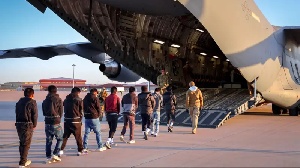- Home - News
- Elections 2024
- News Archive
- Crime & Punishment
- Politics
- Regional
- Editorial
- Health
- Ghanaians Abroad
- Tabloid
- Africa
- Religion
- Photo Archives
- Press Release
General News of Tuesday, 25 March 2025
Source: www.ghanawebbers.com
US DDeportations to Venezuela Resume After Dispute
A flight carrying 199 Venezuelans deported from the US has landed in Venezuela. The plane arrived at Simón Bolívar airport near Caracas.
US repatriation flights to Venezuela had stopped weeks ago. This was after the Trump administration revoked a license for Venezuela to export oil to the US.
On Saturday, both governments agreed to resume the flights. This is part of Trump's plan to remove undocumented migrants.
Venezuelan President Nicolás Maduro called the flights a chance to "rescue and free migrants." As they got off the plane on Monday, some deportees waved their arms.
The deportees were transferred from Texas to Honduras first. They then flew with Venezuelan airline Conviasa to Maiquetía, north of Caracas.
The US Bureau of Western Hemisphere Affairs labeled them as "illegal aliens." They stated these individuals had no right to stay in the United States.
Jorge Rodríguez, head of Venezuela's National Assembly, said migration is "not a crime." In January, Venezuela agreed to accept deportees from the US under a deal made by Richard Grenell.
This agreement was seen as a win for Trump, who prioritizes deporting undocumented migrants. However, Maduro noted that revoking Chevron's license created communication issues.
Maduro wanted better communication lines to bring home Venezuelans unjustly detained in the US. A week later, 238 Venezuelans were deported to El Salvador's mega-prison.
This caused an outcry in Venezuela as families claimed their loved ones had no criminal ties. On Monday, Trump criticized Venezuela for being hostile toward the US.
He accused its government of sending criminals undercover into America. He also announced a "secondary tariff" on Venezuela’s oil exports.
This means countries buying oil from Venezuela will face a 25% tariff when trading with the US. Last week, Secretary of State Marco Rubio warned of escalating sanctions if Venezuela refused its citizens' return.
Maduro responded by ordering his government to ensure return flights for detained migrants. Tariffs are taxes paid by companies buying goods rather than those selling them overseas.
Since taking office in January, Trump has used tariffs for leverage in various disputes unrelated to trade. He plans more tariffs on products like cars and computer chips.
His latest threat against Venezuela aims to pressure current oil buyers like China and India. These countries have provided crucial financial support for Maduro’s government.
Since February, Trump has already raised tariffs on Chinese imports and intends this announcement as an addition. China is a major buyer of Venezuelan oil but not its largest source of crude overall.
The US remains a significant buyer due to exemptions granted to Chevron amid sanctions. The administration updated its order on Monday, giving Chevron until May 27th to wind down operations in Venezuela.
Chevron declined further comment on this matter. Following this announcement, oil prices rose over 1%.











